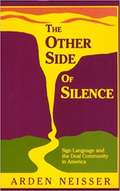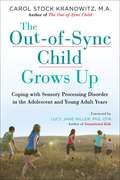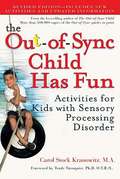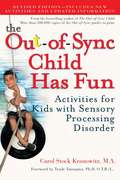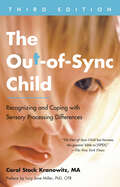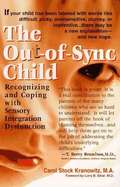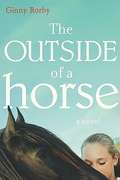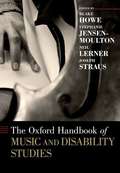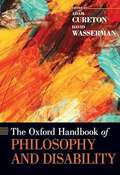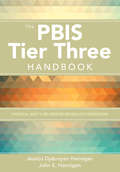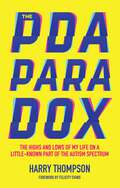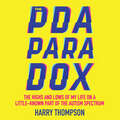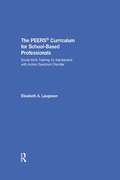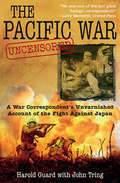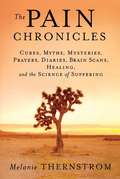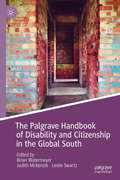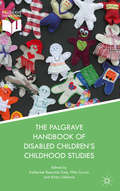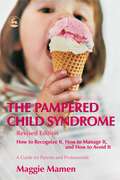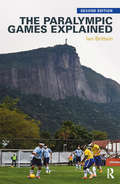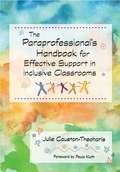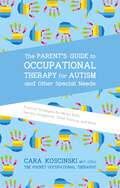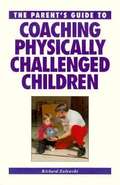- Table View
- List View
The Other Senses
by Preeti MongaAn inspiring true story of a visually impaired woman and her road to success.A trauma counsellor, corporate trainer, writer, aerobics trainer, public speaker, and director of Silver Linings Human Resource Solution Private Limited - all rolled into one, Preeti Monga's achievements are inspirational.
The Other Side of Silence: Sign Language and the Deaf Community in America
by Arden NeisserThe history of the struggle to legitimize sign language against the pressure of a hearing educational establishment intent on forcing upon the deaf the almost impossible task of learning lipreading and speech.
The Out-of-Sync Child Grows Up: Coping with Sensory Processing Disorder in the Adolescent and Young Adult Years (The Out-of-Sync Child Series)
by Carol Kranowitz Lucy Jane MillerThe long-awaited follow-up to the million-copy bestseller The Out-of-Sync Child, presenting information and advice for tweens, teens, and young adults living with Sensory Processing Disorder, and their parents. The Out-of-Sync Child Grows Up will be the new bible for the vast audience of parents whose children, already diagnosed with Sensory Processing Disorder, are entering the adolescent, tween, and teen years, as well as those who do not yet have a diagnosis and are struggling to meet the challenges of daily life. This book picks up where The Out-of-Sync Child left off, offering practical advice on living with SPD, covering everyday challenges as well as the social and emotional issues that many young people with SPD face. Topics include strategies for coping with the sensory aspects of grooming, social lives and dating, playing sports and music, and other issues, as well as how to find support and help from loved ones, occupational therapy, and other resources. Carol Kranowitz's insights are supplemented by first-person accounts of adolescents and teens with SPD, sharing their experiences and hard-won lessons with readers and adding a powerful personal dimension to the book.From the Trade Paperback edition.
The Out-of-Sync Child Has Fun: Activities for Kids with Sensory Processing Disorder
by Carol Stock KranowitzThe first accessible guide to examine Sensory Processing Disorder, The Out-of-Sync Child touched the hearts and lives of thousands of families. Carol Stock Kranowitz continues her significant work with this companion volume, which presents more than one hundred playful activities specially designed for kids with SPD. Each activity in this inspiring and practical book is SAFE--Sensory-motor, Appropriate, Fun and Easy--to help develop and organize a child's brain and body. Whether your child faces challenges with touch, balance, movement, body position, vision, hearing, smell, and taste, motor planning, or other sensory problems, this book presents lively and engaging ways to bring fun and play to everyday situations. This revised edition includes new activities, along with updated information on which activities are most appropriate for children with coexisting conditions including Asperger's and autism, and more.
The Out-of-Sync Child has Fun: Activities for Kids with Sensory Processing Disorder
by Carol Stock KranowitzThis companion volume to The Out-of-Sync Child presents activities that parents of kids with Sensory Integration Dysfunction can do at home with their child to strengthen their child's abilities and have some fun together along the way.
The Out-of-Sync Child, Third Edition: Recognizing and Coping with Sensory Processing Differences (The Out-of-Sync Child Series)
by Carol KranowitzNewly expanded and revised with essential updates and insights, the third edition of this definitive guide delivers new information on sensory processing disorder and differences (SPD). &“The Out-of-Sync Child has become the parents&’ bible to [SPD].&” —The New York Times Does your child experience sudden bursts of anxiety, agitation, or discomfort, or appear sensitive or sensory-craving without explanation? Is your child clumsier than most children, or unable to discriminate between ordinary sounds, sights, and other sensations? Sensory processing differences, in which the central nervous system misinterprets messages from the senses, are common yet widely undiagnosed in young children today. Often overlooked or undiagnosed, SPD impacts thousands of children from all walks of life. This latest edition of Carol Kranowitz&’s renowned and practical guide for parents, teachers, and professionals offers authoritative, research-based information on recognizing SPD and comprehending the diagnosis, and important advice on how to help kids and families cope and thrive. Delivering comprehensive guidance and drug-free interventions, The Out-of-Sync Child is a trusted resource for parents and professionals who want to understand and ease the challenges of living with SPD.
The Out-of-Sync Child: Recognizing and Coping with Sensory Integration Dysfunction
by Carol Stock Kranowitz"Difficult." "Picky." "Oversensitive." "Clumsy." "Unpredictable." "Inattentive." Children who have been labeled with words like these may actually be suffering from Sensory Integration Disorder--a very common, but frequently misdiagnosed, condition that can manifest itself in excessively high or low activity levels, problems with motor coordination, oversensitivity or undersensitivity to sensations and movements, and other symptoms. This guide, written by an expert in the field, explains how SI Dysfunction can be confused with ADD, learning disabilities, and other problems, tells how parents can recognize the problem, and offers a drug-free treatment approach for children who need help.
The Outside of a Horse
by Ginny RorbyHannah Gale starts volunteering at a horse stable because she needs a place to escape. Her father has returned from the Iraq war as an amputee with posttraumatic stress disorder, and his nightmares rock the household. At the stable, Hannah comes to love Jack, Super Dee, and Indy; helps bring a rescued mare back from the brink; and witnesses the birth of the filly who steals her heart. Hannah learns more than she ever imagined about horse training, abuse, and rescues, as well as her own capacity for hope. Physical therapy with horses could be the answer to her fatherÕs prayers, if only she can get him to try.
The Owl Project: A programme of outdoor activities for children in primary schools
by Eloise BruceThe OWL Project is a programme of activities to enable anybody working with primary school age children to help them to develop essential skills for social and emotional wellbeing through nature and gardening activities. If you want to get children outdoors but don’t know where to start, this book is for you. With step-by-step plans, this unique book gives you the tools you need to support children in the natural environment no matter how small your outside space or budget. The session plans include games, gardening activities, social skills starters, and resource suggestions. It is designed to be easy to read and even easier to implement and offers ideas for every season.
The Oxford Handbook of Music and Disability Studies
by Joseph Straus Blake Howe Stephanie Jensen-Moulton Neil LernerThe Oxford Handbook of Music and Disability Studies represents a comprehensive state of current research for the field of Disability Studies and Music. The forty-two chapters in the book span a wide chronological and geographical range, from the biblical, the medieval, and the Elizabethan,through the canonical classics of the eighteenth and nineteenth centuries, up to modernist styles and contemporary musical theater and popular genres, with stops along the way in post-Civil War America, Ghana and the South Pacific, and many other interesting times and places. Disability is a broad, heterogeneous, and porous identity, and that diversity is reflected in the variety of bodily conditions under discussion here, including autism and intellectual disability, deafness, blindness, mobility impairment often coupled with bodily difference, and cognitive and intellectual impairments. Amid this diversity of time, place, style, medium, and topic, the chapters share two core commitments. First, they are united in their theoretical and methodological connection to Disability Studies, especially its central idea that disability is a social and cultural construction. Disability both shapes and is shaped by culture, including musical culture. Second, these essays individually and collectively make the case that disability is not something at the periphery of culture and music, but something central to our art and to our humanity.
The Oxford Handbook of Philosophy and Disability
by David Wasserman Adam CuretonDisability raises profound and fundamental issues: questions about human embodiment and well-being; dignity, respect, justice and equality; personal and social identity. It raises pressing questions for educational, health, reproductive, and technology policy, and confronts the scope and direction of the human and civil rights movements. Yet it is only recently that disability has become the subject of the sustained and rigorous philosophical inquiry that it deserves. <P><P> The Oxford Handbook of Philosophy and Disability is the first comprehensive volume on the subject. The volume's contents range from debates over the definition of disability to the challenges posed by disability for justice and dignity; from the relevance of disability for respect, other interpersonal attitudes, and intimate relationships to its significance for health policy, biotechnology, and human enhancement; from the ways that disability scholarship can enrich moral and political philosophy, to the importance of physical and intellectual disabilities for the philosophy of mind and action. The contributions reflect the variety of areas of expertise, intellectual orientations, and personal backgrounds of their authors. Some are founding philosophers of disability; others are promising new scholars; still others are leading philosophers from other areas writing on disability for the first time. Many have disabilities themselves. This volume boldly explores neglected issues, offers fresh perspectives on familiar ones, and ultimately expands philosophy's boundaries. More than merely presenting an overview of existing work, this Handbook will chart the growth and direction of a vital and burgeoning field for years to come.
The PBIS Tier Three Handbook: A Practical Guide to Implementing Individualized Interventions
by Dr Jessica Djabrayan Hannigan John E. HanniganHelp students with the toughest behavior challenges Students needing Tier Three help are few in number, but they can have the biggest impact on classrooms and school culture. With this interactive handbook, you’ll round out your PBIS system by developing, implementing, monitoring, and sustaining flexible Tier Three interventions to address the most challenging behavior issues. Filled with practical examples, case scenarios, and rubrics, this step-by-step guide helps teams: Identify students in need of Tier Three support Create procedures and protocols for students in both general and special education Develop individualized interventions based on student needs and data
The PBIS Tier Three Handbook: A Practical Guide to Implementing Individualized Interventions
by Dr Jessica Djabrayan Hannigan John E. HanniganHelp students with the toughest behavior challenges Students needing Tier Three help are few in number, but they can have the biggest impact on classrooms and school culture. With this interactive handbook, you’ll round out your PBIS system by developing, implementing, monitoring, and sustaining flexible Tier Three interventions to address the most challenging behavior issues. Filled with practical examples, case scenarios, and rubrics, this step-by-step guide helps teams: Identify students in need of Tier Three support Create procedures and protocols for students in both general and special education Develop individualized interventions based on student needs and data
The PDA Paradox: The Highs and Lows of My Life on a Little-Known Part of the Autism Spectrum
by Harry Thompson Felicity EvansDiagnosed with Pathological Demand Avoidance (PDA) in his teenage years, Harry Thompson looks back with wit and humour at the ups and downs of family and romantic relationships, school, work and mental health, as well as his teenage struggle with drugs and alcohol.By embracing neurodiversity and emphasising that autistic people are not flawed human beings, Thompson demonstrates that some merely need to take the "scenic route" in order to flourish and reach their full potential. The memoir brings to life Harry's past experiences and feelings, from his torrid time at school to the peaceful and meaningful moments when he is alone with a book, writing or creating YouTube videos.Eloquent and insightful, The PDA Paradox will bring readers to shock, laughter and tears through its overwhelming honesty. It is a turbulent memoir, but it ends with hope and a positive outlook to the future.
The PDA Paradox: The Highs and Lows of My Life on a Little-Known Part of the Autism Spectrum
by Harry ThompsonA memoir by an adult with PDA, reflecting back on his early childhood through to present day.Diagnosed with Pathological Demand Avoidance (PDA) in his teenage years, Harry Thompson looks back with wit and humour at the ups and downs of family and romantic relationships, school, work and mental health, as well as his teenage struggle with drugs and alcohol.By embracing neurodiversity and emphasising that autistic people are not flawed human beings, Thompson demonstrates that some merely need to take the "scenic route" in order to flourish and reach their full potential. The memoir brings to life Harry's past experiences and feelings, from his torrid time at school to the peaceful and meaningful moments when he is alone with a book, writing or creating YouTube videos.Eloquent and insightful, The PDA Paradox will bring readers to shock, laughter and tears through its overwhelming honesty. It is a turbulent memoir, but it ends with hope and a positive outlook to the future.(P)2021 Jessica Kingsley Publishers
The PEERS® Curriculum for School Based Professionals: Social Skills Training for Adolescents With Autism Spectrum Disorder
by Elizabeth A. LaugesonThe PEERS® Curriculum for School-Based Professionals brings UCLA's highly acclaimed and widely popular PEERS program into the school setting. This sixteen-week program, clinically proven to significantly improve social skills and social interactions among teens with autism spectrum disorder, is now customized for the needs of psychologists, counselors, speech pathologists, administrators, and teachers. The manual is broken down into clearly divided lesson plans, each of which have concrete rules and steps, corresponding homework assignments, plans for review, and unique, fun activities to ensure that teens are comfortable incorporating what they've learned. The curriculum also includes parent handouts, tips for preparing for each lesson, strategies for overcoming potential pitfalls, and the research underlying this transformative program.
The Pacific War Uncensored: A War Correspondent's Unvarnished Account of the Fight Against Japan
by Harold Guard John TringA WWII reporter&’s dangerous adventures in Singapore, Malaya, Java, and more. Harold Guard became a war correspondent by chance after he&’d been invalided out of the navy following a submarine accident. Thereafter, working for United Press, he gained a front-row seat to many of the most dramatic battles and events of the century. In March 1942, Guard arrived in Australia, having narrowly escaped from Japanese forces invading Singapore and Java. His dispatches from that disastrous front prompted one observer to comment on &“the crisis days when everybody except Harold Guard was trying to hush up the real situation.&” At the time, he was acclaimed by the Australian press as one of the top four newspapermen covering the war in the Pacific. Over the next three years, Guard was to have many more adventures reporting on the Pacific War, including firsthand experience flying with the US Air Force on twenty-two bombing missions, camping with Allied forces in the deadly jungles of New Guinea, and taking part in attacks from amphibious landing craft on enemy occupied territory. He also traveled into the undeveloped areas of Australia&’s northern territories to report on the construction of air bases being built in preparation for defending the country against the advancing Japanese. What made Harold Guard&’s achievements even more remarkable was that he was disabled and had to walk with a stiff right leg due to his navy injury. Despite this, he often reported from perilous situations at the front line, which gained him considerable notoriety within the newspaper world. Guard endeavored to give honest accounts, and this often brought him into conflict with the military censors. In this book, the full story of Guard&’s experiences and observations during the Pacific War have been reconstructed with the help of his dispatches, private correspondence, telegrams, and audio accounts. No longer subject to censorship, the starkly honest perceptions of how the Allies nearly failed and, at last, finally won the war can now be told.
The Pain Chronicles: Cures, Myths, Mysteries, Prayers, Diaries, Brain Scans, Healing, and the Science of Suffering
by Melanie ThernstromEach of us will know physical pain in our lives, but none of us knows when it will come or how long it will stay. Today as much as 10 percent of the population of the United States suffers from chronic pain. It is more widespread, misdiagnosed, and undertreated than any major disease. While recent research has shown that pain produces pathological changes to the brain and spinal cord, many doctors and patients still labor under misguided cultural notions and outdated scientific dogmas that prevent proper treatment, to devastating effect. In The Pain Chronicles, a singular and deeply humane work, Melanie Thernstrom traces conceptions of pain throughout the ages---from ancient Babylonian pain-banishing spells to modern brain imaging---to reveal the elusive, mysterious nature of pain itself. Interweaving first-person reflections on her own battle with chronic pain, incisive reportage from leading-edge pain clinics and medical research, and insights from a wide range of disciplines: science, history, religion, philosophy, anthropology, literature, and art. Thernstrom shows that when dealing with pain we are neither as advanced as we imagine nor as helpless as we may fear. Both a personal meditation and an intellectual exploration,The Pain Chronicles illuminates and makes sense of the all-too-human experience of pain and confronts with extraordinary grace and empathy its peculiar traits, its harrowing effects, and its various antidotes.
The Palgrave Handbook of Disability and Citizenship in the Global South (Palgrave Studies in Disability and International Development)
by Leslie Swartz Brian Watermeyer Judith McKenzieThis handbook questions, debates and subverts commonly held assumptions about disability and citizenship in the global postcolonial context. Discourses of citizenship and human rights, so elemental to strategies for addressing disability-based inequality in wealthier nations, have vastly different ramifications in societies of the Global South, where resources for development are limited, democratic processes may be uncertain, and access to education, health, transport and other key services cannot be taken for granted. In a broad range of areas relevant to disability equity and transformation, an eclectic group of contributors critically consider whether, when and how citizenship may be used as a lever of change in circumstances far removed from UN boardrooms in New York or Geneva. Debate is polyvocal, with voices from the South engaging with those from the North, disabled people with nondisabled, and activists and politicians intersecting with researchers and theoreticians. Along the way, accepted wisdoms on a host of issues in disability and international development are enriched and problematized. The volume explores what life for disabled people in low and middle income countries tells us about subjects such as identity and intersectionality, labour and the global market, family life and intimate relationships, migration, climate change, access to the digital world, participation in sport and the performing arts, and much else.
The Palgrave Handbook of Disabled Children’s Childhood Studies
by Katherine Runswick-Cole Tillie Curran Kirsty LiddiardDisabled children's lives have often been discussed through medical concepts of disability rather than concepts of childhood. Western understandings of childhood have defined disabled children against child development 'norms' and have provided the rationale for segregated or 'special' welfare and education provision. In contrast, disabled children's childhood studies begins with the view that studies of children's impairment are not studies of their childhoods. Disabled children's childhood studies demands ethical research practices that position disabled children and young people at the centre of the inquiry outside of the shadow of perceived 'norms'. The Palgrave Handbook of Disabled Children's Childhood Studies will be of interest to students and scholars across a range of disciplines, as well as practitioners in health, education, social work and youth work.
The Pampered Child Syndrome: How to Recognize it, How to Manage it, and How to Avoid it – A Guide for Parents and Professionals
by Maggie MamenThe Pampered Child Syndrome is a welcome source of advice for parents or professionals working with children who are given all the love and care they need, yet who remain unhappy, anxious or angry. This book argues that we live in a society where real progress has been made in the development of child-centered parenting, education and care, but that this cultural shift has produced a generation of children who are entitled to the same rights as adults but not ready to accept grown-up responsibilities - children who are 'loved too much'. Dr. Maggie Mamen describes common characteristics of the pampered child, and offers practical advice on how to strike an effective balance between caring for and nurturing children while at the same time maintaining authority and respect. The Pampered Child Syndrome also tackles the difficult issue of child mental health. Drawing on her professional expertise as a clinical psychologist, Dr. Maggie Mamen outlines how the 'symptoms' of the pampered child can be similar to those used to diagnose many common emotional, behavioral, and psychiatric disorders. She flags up the danger of misdiagnosis and asserts the critical importance of maintaining a distinction, offering clear guidance on identifying genuine disorders. This book will offer valuable support and encouragement to parents, teachers, and health and social care professionals who want to raise children who are confident, happy, healthy, and socially aware.
The Paralympic Games Explained: Second Edition
by Ian BrittainThe Paralympic Games is the second largest multi-sport festival on earth and an event which poses profound and challenging questions about the nature of sport, disability and society. The Paralympic Games Explained is the first complete introduction to the Paralympic phenomenon, exploring every key aspect and issue, from the history and development of the Paralympic movement to the economic and social impact of the contemporary Games. Now in a fully revised and updated second edition, it includes new material on hosting and legacy, Vancouver 2010 to Rio 2016, sport for development, and case studies of an additional ten Paralympic nations. Drawing on a range of international examples, it discusses key issues such as: • how societal attitudes influence disability sport • the governance of Paralympic and elite disability sport • the relationship between the Paralympics and the Olympics • drugs and technology in disability sport • classification in disability sport. Containing useful features including review questions, study activities, web links and guides to further reading throughout, The Paralympic Games Explained is the most accessible and comprehensive guide to the Paralympics currently available. It is essential reading for all students with an interest in disability sport, sporting mega-events, the politics of sport, or disability in society.
The Paraprofessional's Handbook For Effective Support In Inclusive Classrooms
by Julie Causton-TheoharisWhat does a great paraprofessional need to know and do? Find out in this handy survival guide, equally useful for the brand-new paraprofessional or the 20-year classroom veteran. Packed with friendly guidance, practical tips, and relatable first-person stories, this book reveals the best ways to provide effective, respectful services to students in inclusive classrooms. Julie Causton-Theoharis, a teacher, professor, and educational consultant with more than 10 years of experience as a paraprofessional instructor, knows exactly how to help readers stop feeling overwhelmed so they can start making a difference. She answers all the urgent questions paraprofessionals have as they navigate their complex job in the inclusive classroom, showing readers how to: provide skillful and subtle support to students while encouraging their independence resolve challenging behavior in gentle and positive ways find students' strengths and match support practices to them fade their support make informed decisions about content-specific accommodations, modifications, and adaptations presume competence and keep expectations high facilitate peer supports and friendships partner with teachers, SLPs, psychologists, families, and other members of the educational team relieve their own stress and avoid burnout To help them master the daily ups and downs of the inclusive classroom, paraprofessionals will get ready-to-use practical content: tips for supporting students with specific disabilities, helpful question-and-answer sections, examples of successful problem-solving, a quick-guide to acronyms in education, easy ideas for improving teamwork, and more. The essential guide for every paraprofessional and a must-have for the educators and other professionals who support them this empowering book takes the guesswork out of a critical classroom role and helps students with disabilities reach their full potential.
The Parent's Guide to Occupational Therapy for Autism and Other Special Needs: Practical Strategies for Motor Skills, Sensory Integration, Toilet Training, and More
by Cara KoscinskiWith the help of this handy guide, you can bring tried and tested occupational therapy activities into your home and encourage your child to succeed with everyday tasks while having fun in the process. This expanded edition of the award-winning book includes new advice on toilet training, coping with changes in routine, repetitive behaviors, self-regulation and much more. The simple explanations and easy exercises will soon make daily activities enjoyable and productive.
The Parents Guide to Coaching Physically Challenged Children
by Richard ZulewskiHandbooks in The Better Way Coaching Kids series serve as the perfect step-by-step introductory primers for parents and coaches. Written in an easy, conversational style, these books cover all the basic skill-building techniques, rules of the games, proper equipment and first aid. These guides focus on team spirit, the importance of fair play and overall fun. Special attention is paid to developing a child's confidence and self-esteem, -- all important keys to success.

